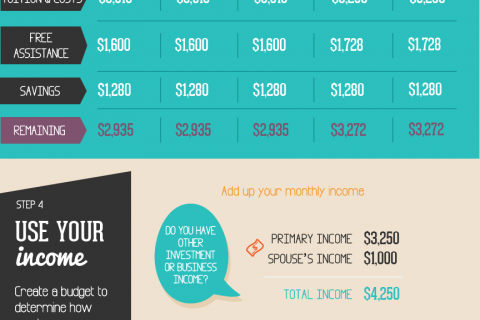Request Information
We're Sorry
There was an unexpected error with the form (your web browser was unable to retrieve some required data from our servers). This kind of error may occur if you have temporarily lost your internet connection. If you're able to verify that your internet connection is stable and the error persists, the Franklin University Help Desk is available to assist you at helpdesk@franklin.edu, 614.947.6682 (local), or 1.866.435.7006 (toll free).
Just a moment while we process your submission.

How Much Does an Online Bachelor’s Degree Cost?
Undergraduate degrees, on average, lead to a lifetime of higher earnings – but they require a significant up-front investment. That’s especially true today since the cost of a bachelor’s degree has nearly tripled since 1980 after inflation.
Earning your college degree online can be one way to save money on your education, and in recent years online degrees have grown significantly in popularity and quality. However, you should know what to watch out for to make sure you’re getting the best possible deal.
Can You Get a Bachelor’s Degree Online?
.png)
At many institutions, it’s possible to earn a bachelor’s degree without ever setting foot on campus.
While distance learning has been an option for a long time, the popularity and quality of remote learning have both shifted drastically in recent years. Between 2012 and 2019 (before the COVID-19 pandemic increased remote learning by 92%), the number of distance-only students at traditional universities had already grown by 36%.
Just like the COVID-19 pandemic accelerated the shift to remote work, it also accelerated the shift to remote learning. In the fall of 2020, around three-quarters of U.S. university students were enrolled in at least one remote course. This transition showed many students that online learning can be just as good as – or better than – in-person learning. Advances in technology, like high-quality video conferencing and synchronous and asynchronous communications platforms, mean that online students can now interact just as closely with their classmates and professors as their in-person counterparts.
When it comes to your qualifications, a degree earned online from an accredited institution counts just the same as a degree earned in person. However, when you research online programs, it’s essential to check that any institutions you are considering are accredited, meaning that they’ve met certain standards for quality. You can do so using the U.S. Department of Education’s Database of Accredited Postsecondary Institutions and Programs.
.png)
Is Online College Cheaper than In-Person?
An online degree doesn’t require physical facilities, so it should be cheaper, right? Not always.
At some public universities, the per-credit cost of online classes is actually higher than in-person courses. However, even at these schools, online students can save significantly on costs outside of tuition by avoiding paying for things like costly campus room and board.
Part of the reason for this discrepancy is that universities that primarily offer in-person learning still have to pay for things like facilities upkeep and on-campus programming. Schools like Franklin that focus on hybrid or online-only bachelor’s degrees, on the other hand, don’t carry the costs of maintaining extensive facilities. Therefore, the most affordable online colleges can charge significantly lower tuition than many schools that offer both on-campus and online learning.
“Ask what kind of extras you are paying for,” said Whitney Dodds, undergraduate admissions team lead for Franklin University. “If you're a student at a traditional university and you're taking online courses or even a mix of in-person and online courses, but you're not fully immersed in that resident life, are you paying for a lot of programs and facilities you aren’t using?”
When it comes to paying for school, grants are among your best options. But do you know how to find them? Remove the guesswork by downloading this free guide
How Much Does It Cost to Get a Bachelor’s Degree Online?
Like in-person degree programs, the cost of an online bachelor’s degree varies significantly between institutions.
At many universities, especially state institutions, you can expect to pay the same (or more) tuition for an online degree that you would if you studied in person. Currently, the median annual tuition and fees for bachelor’s degrees in the U.S. are $10,940 for an in-state public university, $28,240 for an out-of-state public university and $39,400 for private universities, according to the College Board. Those figures refer to tuition and fees alone and do not take into account additional expenses, such as room, board and transportation, that are common for in-person students.
Less than half of first-time undergraduate students complete their degrees in four years or less, meaning that the total cost of a bachelor’s degree can be higher than expected.
At Franklin University, the annual cost of tuition and fees for undergraduate students is currently less than the median for in-state students at public universities, with a cost per credit hour of just $398. Plus, since online programs offer significant schedule flexibility, students can continue working while they study and do not need to pay for on-campus housing or transportation.
How Can You Reduce the Cost of an Online College Degree?
Even if you choose a low-cost, online-focused school, there are still ways to save on your degree.
1. Apply for scholarships and financial aid.
As an online undergraduate student, you are eligible for the same federal student aid as traditional students. You can apply for grants and loans using the Free Application for Federal Student Aid (FAFSA), an online application administered by the U.S. Department of Education.
Online students are also eligible for many scholarships. Each organization that offers scholarships sets its own criteria, but qualifications often include a solid academic record, a specific life experience (like being an adult learner returning to complete a degree), or membership in a certain group (such as a racial, ethnic or religious group).
Franklin offers a streamlined scholarship application process as part of the admissions application that allows you to check off the scholarships that you are eligible for without requiring additional applications.
2. Examine tuition rates carefully
Different schools tend to present their tuition, fees and associated costs in different ways, which means it can be challenging to make good comparisons between programs. Be sure to add up all of the expected fees and charges and compare multiple institutions to ensure that you don’t inadvertently end up paying for programs and services you won’t access as an online student.
3. Look into transfer credits
If you’ve previously taken any college courses or passed equivalency exams, find out if the schools you’re considering will allow you to transfer those credits. Policies vary between universities, but many online degree programs are especially transfer-friendly. Franklin University, for example, allows students to bring in up to 94 credits, equivalent to approximately three years of a degree program. You may also be able to earn credits for professional training or certificates that you’ve already completed, which can help you save money while completing your degree faster. Since 2017, Franklin University students have saved more than $6 million dollars through prior learning credits.
4. Keep working while you study
Working and studying at the same time isn’t always easy, but it tends to be far simpler with online degrees since their schedules are more flexible and they are often designed asynchronously. Plus, any commutes between school and work are eliminated.
Even if you only earn enough to cover part of your tuition or living expenses, you can significantly reduce the amount of loans required to complete your degree.
Is an Online Bachelor’s Degree Right for You?
In addition to the opportunity for significant cost savings, online degree programs offer several other advantages that can make them an excellent fit for many students.
Since you don’t need to move to campus – and potentially pay for required on-campus housing – to study online, you can significantly reduce your housing costs. Similarly, you’ll avoid paying for expensive transportation or spending time commuting to campus.
For adult learners in particular, it’s much easier to fit online courses around other professional and family responsibilities. The student bodies of online programs also tend to be more diverse, with many more working adults represented. If you fall into that category, having classmates with similar life experiences can be helpful.
The choice between an online and in-person degree depends on your goals, priorities and responsibilities. If living on campus and participating in student activities are important to you, an in-person degree may be a better fit. An online degree might be a better option if you desire additional flexibility and cost savings.
Explore Online Bachelor’s Degree Options
Franklin University offers more than 30 online bachelor’s degree programs, which use asynchronous scheduling as much as possible to maximize flexibility for students.
Since most Franklin students study online, the university does not have to pay for the upkeep of extensive campus property or programs for in-person students, allowing Franklin to keep tuition rates low and focus on what matters most – learning.
Plus, Franklin’s tuition guarantee means that as long as you remain enrolled full-time, your tuition rate will not increase.
Learn more about the cost of a degree at Franklin.





